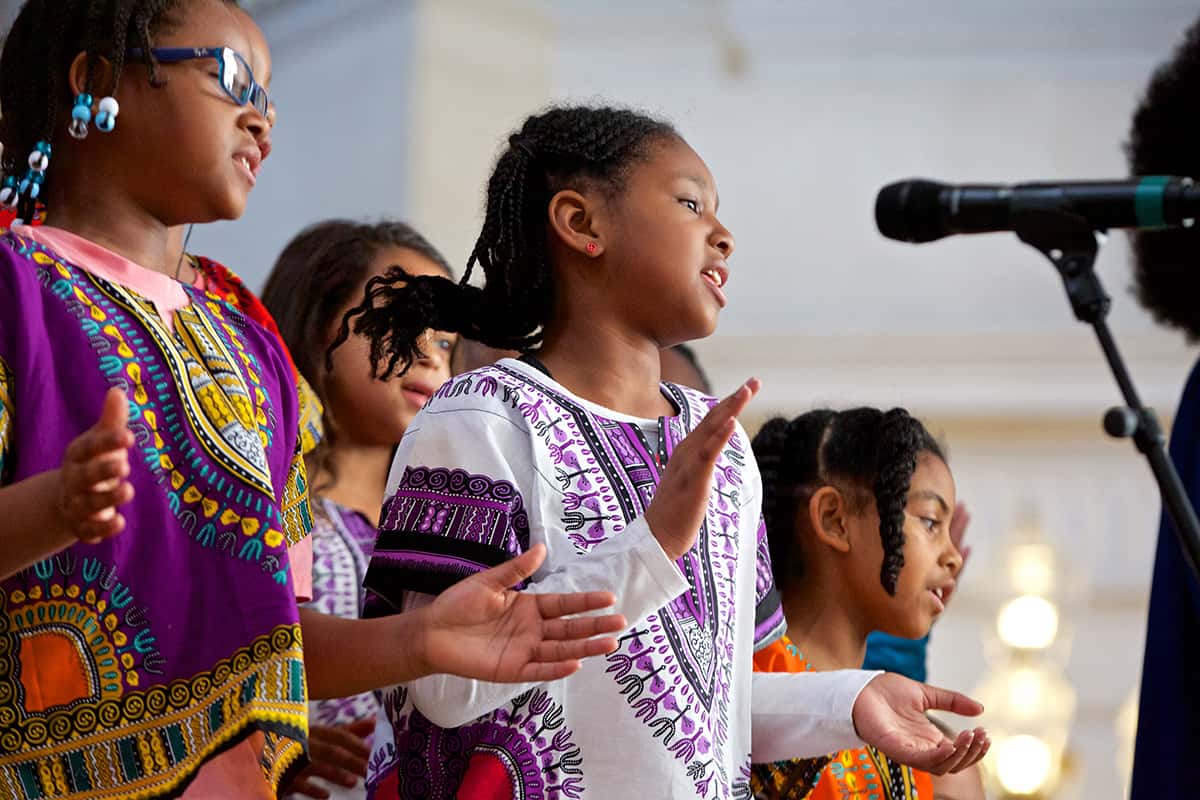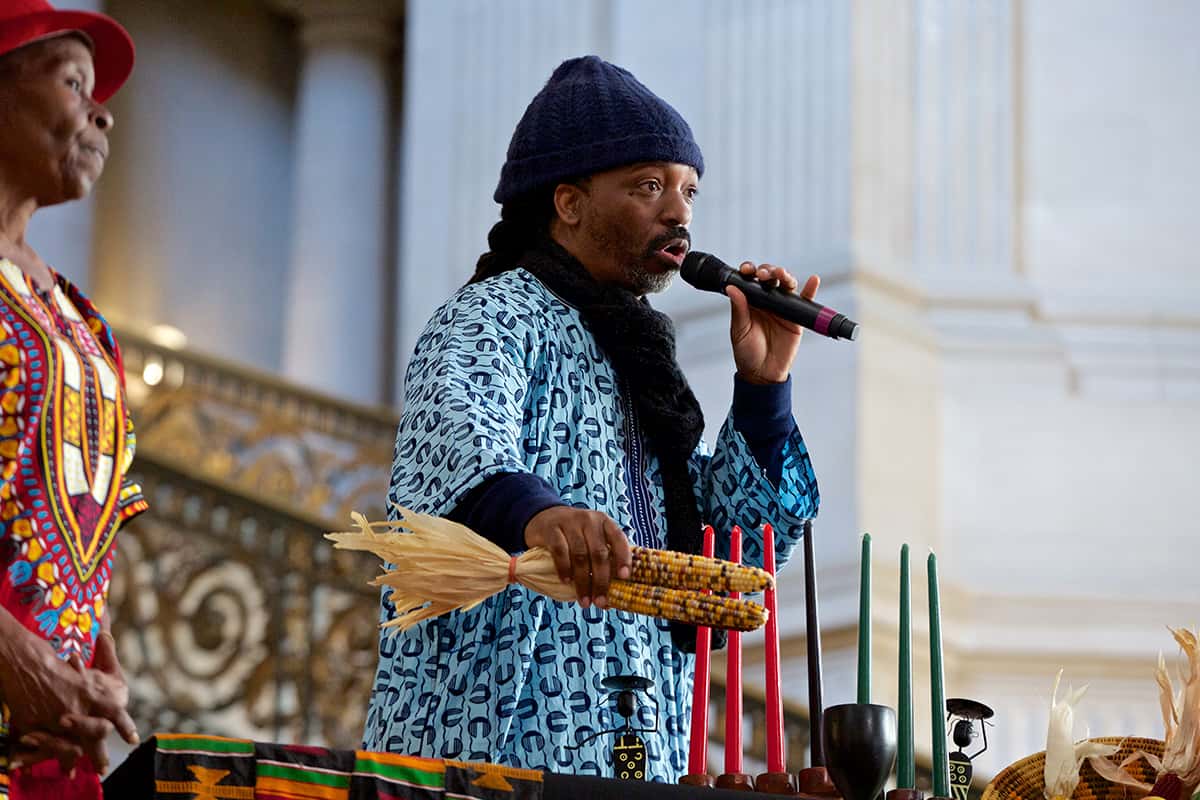
by George Rahsaan Brooks-Bey
Kwanzaa is an African American and Pan-African holiday which celebrates family, community and culture. Celebrated from Dec. 26 to Jan. 1, its origins are in the first harvest celebrations of Africa from which it takes its name. The name Kwanzaa is derived from the phrase “matunda ya kwanza,” which means “first fruits” in Swahili, a Pan-African language which is the most widely spoken African language.
The first fruits celebrations are rooted in African history as far back as ancient Egypt and Nubia and appear in ancient and modern times in other classical African civilizations such as Ashanti and Yorubaland. These civilizations are also found in ancient and modern times among societies as large as empires, such as the Zulus or the Kingdom of Swaziland, or smaller societies and groups like the Matabele, Thonga and Lovedu, all of Southeastern Africa.
Kwanzaa builds on our five fundamental activities of continental African “first fruit” celebrations: in-gathering, reverence, commemoration, recommitment and celebration. So to me, Kwanzaa is a) a time of ingathering of the people to reaffirm the bonds between them, b) a time of special reverence for the Creator Force and creation in our thanks and respect for our blessings and the bountifulness and beauty of creation, c) a time for commemoration of the past in pursuit of its lessons and in honor of its models of human excellence and our ancestors, d) a time of recommitment to our highest cultural ideals in our ongoing effort to always bring forth the best of African cultural thought and practice and e) a time for celebration of the good, the good of life and of excellence itself, the good of family and friends, the good of culture and community, the good of the awesome and the ordinary and the good of the divine, natural and social.
Rooted in this ancient history and culture, Kwanzaa develops as a flourishing branch of African American life and struggle and as a re-created and expanded ancient tradition. Thus it bears special characteristics not only as an African American holiday and celebration but also as a Pan-African one. For it draws from the cultures of various African people, and is celebrated by millions of Black people throughout the world and African community.
Moreover, these various African people celebrate Kwanzaa because it speaks not only to African Americans in a special way, but also to Africans as a whole, in its stress on history, values, family, community and culture. Kwanzaa was established in 1966 in the midst of the Black Freedom Movement and thus reflects its concern for cultural groundedness in thought and practice and the unity and self-determination associated with Kwanzaa. It was conceived and established by Black Americans to serve several positive and progressive functions.
Still, in this day and time, there are a lot of African Americans ignorant to the historical analogy of Kwanzaa and why it’s so very important for Black people to celebrate it, so they still, until this day, discount it. Keeping it real, if we do not put a stated priority on more self-reliance for the advancement of the Black community, then no one else outside of our community will deem our plight a matter of priority or concern.
We must invest in our communities. Self-investment is a key to self-improvement. Nearly 50-million strong, Black Americans in 2020 and beyond should be able to focus and target our spending, our savings, our investment and our giving back to the less fortunate in our communities – for one of the greatest and most effective gifts is the gift of providing access to the highest quality education for our children.

Kwanzaa (The First Fruits), a celebration of family, community and culture: The Seven Principles
1. UMOJA (Unity): To strive for and maintain unity in the family, community, nation and race.
2. KUJICHAGULIA (Self-determination): To define ourselves, name ourselves, create for ourselves and speak for ourselves instead of being defined, named, created for and spoken for by others.
3. UJIMA (Collective Work and Responsibility): To build and maintain our community together and make our sister’s and brother’s problems our problems and to solve them together.
4. UJAMAA (Cooperative Economics): To build and maintain our stores, shops and other businesses and to profit from them together.
5. NIA (Purpose): To make our collective vocation the building and developing of our community in order to restore our people to their traditional greatness.
6. KUUMBA (Creativity): To do always as much as we can, in the way we can, in order to leave our community more beautiful and beneficial than we inherited it.
7. IMANI (Faith): To believe with all our heart in our people, our parents, our teachers, our leaders and the righteousness and victory of our struggles.
May our hearts be filled with pride and joy as we celebrate
the Kwanzaa holidays!

Habari Gani!
This holiday season of Christmas and Kwanzaa is the season to focus on putting a strategy together to solve or reduce violence, focus on reducing and ending poverty, disease, and injustice that combine to create so much misery for our people. No greater joy can come than from uplifting ourselves to improve the quality of life for all people of color and for all people who yearn and cry out for a more productive way of life.
We must unify and collectively work together in order to build and maintain our communities, make our sisters’ and brothers’ problems our problems and solve them together. We must be self-determining and responsible for our acts and our reactions: Umoja, Kujichagulia and Ujima.
There is an Ashanti African proverb which states: “The ruin of a nation begins within the home of its people.”
I read newspapers, watch news shows, and from the flush four corners of my prison ceil I am appalled at the shootings and senseless deaths of our young people. After all, they are our sons and daughters, our grandchildren, our nieces, nephews and our cousins, killing each other; these are our children, who are dying or maimed by the hands of other children.
In good conscience, we can no longer sit quietly by, wringing our hands and shaking our heads at the latest news accounts announcing that yet another life has been lost. These seemingly senseless murders, though committed by a few, have created a cycle of violence and trauma experienced by everyone living, working and owning businesses in our communities.
This culture of violence, which has threatened the life-blood of our communities, is so pervasive that we can’t even go to a high school sports event, outdoor park, picnic or concert. Absent unity, self-determination, collective work and responsibility, cooperative economics, purpose, creativity and faith, our communities will descend into further chaos and lawlessness.
When mothers have to snatch up their children in fear at a public event because of a shooting, we must unify to stop it. When our elders are so fearful they cannot walk outside of their homes, we must unify to correct it. When schoolchildren witness a person wounded and bloodied outside of their school building, we must unify to stop it. We are existing in a culture of violence, where some people suffering from self-hate, ignorance and indifference, and bent on destruction, are holding our entire neighborhoods hostage. We must unify to stop that madness.
There is a multitude of underlying causes for this culture of hate and violence that is so pervasive in our communities – causes that include rage and ignorance, apathy and denial, unemployment and underemployment, miseducation and racism. The school to prison pipeline, the prison industrial complex and the glamorizing of gangster-like activity can also be included. The roots of this culture of violence, continuing to escalate in our communities, calls for us to adopt the Nguzo Saba (the Seven Principle of Kwanzaa) daily as our solution to these deep-seated problems.
Let us give continuous attention to the future, and let us give deep consideration of the consequences to the things we continue to allow to occur.
HAPPY KWANZAA. May these celebrations reaffirm and reinforce the bonds between us as a people!
Send our brother some love and light: George Rahsaan Brooks-Bey, AP-4884, SCI Coal Township, P.O. Box 33028, St. Petersburg FL 33733.





